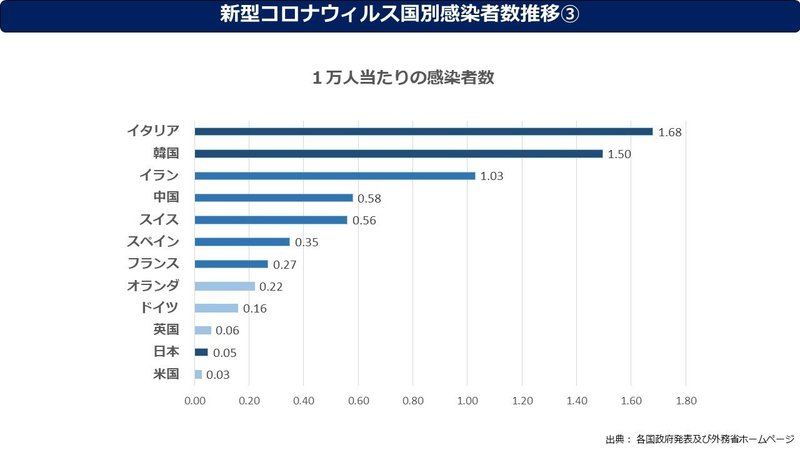
WHOが 起こした「PANDEIC」
新型コロナウィルスの 事を書く場合は
基本、政府機関の発表資料を用いて(外務省・厚生労働省)
個人的に 素人主観で 書いてます。
やっと WHOが、PANDEIC宣言をしました。
3月9日のニュースに このようなものがあります。
==============================================================
中国政府 WHOに21億円の寄付を決定
2020年3月9日 16時58分
☆中国政府はWHO=世界保健機関に対し、新型コロナウイルスの感染拡大防止に向けた国際的な協力のためだとして、2000万ドル、日本円でおよそ21億円を寄付することを決めました。
新華社通信によりますと、中国政府はWHOに関して
「テドロス事務局長のもと、感染拡大の防止に重要な役割を果たしていることを称賛する」と高く評価したうえで、
「今回の寄付は保健医療体制が整っていない国々への支援が必要だというWHOの呼びかけに応えるものだ」としています。
テドロス事務局長は中国での感染が急激に拡大したことし1月に北京を訪れて習近平国家主席と会談し、
「中国の取り組みを称賛した」などと国営メディアで伝えられています。
☆菅官房長官「すでに10億円拠出表明 WHOの活動に期待」
菅官房長官は午後の記者会見で「日本としてはWHOが保健専門機関としてその専門性をいかした活動を推進することを期待しており、発展途上国の感染症対策の強化に充てるためにすでにおよそ10億円の拠出を表明している。引き続き、WHOおよび関係各国などと連携し、事態の収束に向けて全力で取り組んでいきたい」と述べました。
==============================================================WHO 事務局長 テドロス・アダノム・ゲブレイェソスは、3月11日の声明で
日本を密かに外しています。日本が 一番危険な国と言ってのは 3月2日。
菅官房長官の声明から 2日間で 外したのです。実は、3月10日には 声明を
出していないので 実質 寄付の声明を持って 日本への非難を止めたと言う
訳です。又、同日、WHOは、個別に発表していた 中国の省及び全体の
発生患者数の公表を止めました。
アメリカは 一番負担金が 多い為に そもそも触れていません。
2009年の豚インフルエンザの PANDEICが、新婚旅行に重なっているので
嫌な予感がしましたので 今回の新型コロナウィルスを追いかけていました。
世界最大の人口の国が、発症したウィルスであり 11年前と違い 中国が
海外旅行を ある程度自由に出来るように なった事が 原因です。
日本は、2月2日には 世界で2番目の感染者数でした。
しばらく 拡散が 認められませんでしたが 2月後半に 状況が 代わりました。

WHOは、名指しで日本を 非難して来ましたが 寄付が発表されると止めま
した。3月6日以来、アゼルバイジャン、中国、韓国、サウジアラビア王国が
寄付をする表明した事を WHOは 3月9日に発表しました。実際の入金は
日本と中国だけと思います。サウジアラビアは 直後に クーデターが問題で 皇子2名が 拘束されるという大事件が ありました。少し時間が掛かるでしょう。韓国?デフォルト話を ここ数年ずっとしていて 経済が低迷している
状態で 寄付をする事は 国民感情が 許すのでしょうか?
厚生労働省発表では
・国内感染者は619名(患者553名、無症状病原体保有者66名)。
・空港検疫で1名患者が確認。
・合計すると620名。
・国内死亡者は15名。
当初、3月10日まで 各種の自粛を求めていた日本政府を 世界中が
笑 安部首相の独断でしたと非難してきたましたが 3月11日の 1万人当たりの
患者数は スイス・フランス・オランダ・ドイツ・英国が 一気に 追い抜きました。

0.05とは、中国のよく分からない都市と一緒です。
世界が 不思議なのは この中国の死亡者数です。
日本でも 15名の死亡を出していますが、中国の山東省より 医療が 劣るとは
考えていません。又、EU圏の死亡者数も 中国の発表と大きく違うのです。
現在、WHOが、中国の公表している死亡数を 改竄している疑惑があります。日本の死亡率は、2.4% 。中国が、3.8% この数字が EU圏の判断を 狂わせています。湖北省の死亡率 4.4%を他の地域に 掛けた場合。577人は
増えると思いますが 比較的医療が 整っている イタリアの死亡率は、6.2%。
少なくとも 中国で 5,000人以上 死んでいないと イタリア人は不思議な
訳です。中国に 渡航してませんが TVで 報道を見ていた中で 4.4%キープしているような体制だったか 疑問なのです。

WHO事務局長の 3月11日の声明文です。
無責任過ぎます。
胸に刺さりません。
スイスも拡大中です。現場に出向いて 感染してください。
世界中が 望んでいます。==============================================================
(Google 日本語約)
COVID-19-2020年3月11日に関するメディアブリーフィングでの
WHO事務局長の開会挨拶 2020年3月11日
こんにちは。
過去2週間で、中国以外のCOVID-19の症例数は13倍に増加し、
影響を受ける国の数は3倍になりました。
現在、114か国に118,000を超える症例があり、4,291人が命を
落としています。
数千人が病院での生活のために戦っている。
今後数日および数週間で、症例数、死亡者数、および影響を受ける国の数がさらに増加することが予想されます。
WHOはこの発生を24時間体制で評価してきました。私たちは、拡散と深刻度の警戒レベルと、不作為の警戒レベルの両方に深く懸念しています。
そのため、COVID-19はパンデミックとして特徴付けられると評価しました。 パンデミックは、軽くまたは不注意に使用する言葉ではありません。誤用された場合、不当な恐怖、または戦いが終わったという不当な受け入れを引き起こし、不必要な苦痛と死につながる可能性があるという言葉です。
状況をパンデミックとして説明しても、このウイルスによってもたらされる脅威に関するWHOの評価は変わりません。WHOの行動は変わりませんし、各国の行動も変わりません。
私たちは、コロナウイルスによって引き起こされたパンデミックを見たことはありません。これはコロナウイルスによって引き起こされる最初のパンデミックです。
そして、同時に制御できるパンデミックをこれまで見たことがありません。 最初のケースが通知されてから、WHOは完全対応モードになっています。 そして、私たちは、各国が緊急かつ積極的な行動を取るよう毎日呼びかけています。
警報ベルを大声でクリアに鳴らしました。
月曜日に私が言ったように、症例の数と影響を受ける国の数を見るだけでは、完全な話をしません。
114か国で世界的に報告された118,000の症例のうち、症例の90%以上がたった4か国にあり、そのうち2つ(中国と韓国)で流行が著しく減少しています。 81か国が症例を報告しておらず、57か国が10症例以下を報告しています。
私たちはこれを十分に、または十分に、または十分に頻繁に言うことはできません。すべての国がこのパンデミックの進路を変えることができます。
各国が応答で人々を検出、テスト、治療、隔離、追跡、動員する場合、少数のケースを持つ人々は、それらのケースがクラスターになり、それらのクラスターがコミュニティ伝達になるのを防ぐことができます。
コミュニティへの感染や大規模なクラスターを抱えている国でさえ、このウイルスの流れを変えることができます。
いくつかの国では、このウイルスを抑制および制御できることが実証されています。
今大規模なクラスタやコミュニティの伝送を扱っている多くの国にとっての課題は、彼らがいるかどうかではないことができます同じことを行う-それは、彼らがいるかどうかだでしょう。
一部の国は能力不足に苦しんでいます。
一部の国は資源の不足に苦しんでいます。
いくつかの国は決意の欠如に苦しんでいます。
私たちは、イラン、イタリア、および韓国でウイルスを遅くし、それらの流行を制御するために講じられている措置に感謝しています。
これらの措置は、中国と同じように社会と経済に大きな打撃を与えていることを知っています。
すべての国は、健康の保護、経済的および社会的混乱の最小化、および人権の尊重の間でバランスをとらなければなりません。
WHOの義務は公衆衛生です。しかし、私たちはすべてのセクターの多くのパートナーと協力して、このパンデミックの社会的および経済的影響を緩和しています。
これは単なる公衆衛生危機ではなく、すべてのセクターに影響を与える危機です。したがって、すべてのセクターとすべての個人が戦いに関与しなければなりません。
私は、感染症を防ぎ、命を救い、影響を最小限に抑えるための包括的な戦略に基づいて構築された、政府全体、社会全体のアプローチをとらなければならないことを最初から述べました。
4つの重要な領域にまとめます。
まず、
・準備して準備をします。
・第二に、検出、保護、治療します。
・第三に、伝送を減らします。
・第四に、革新し、学びます。
私は、すべての国に、あなたの緊急時対応メカニズムを有効にしてスケールアップするよう呼びかけていることを思い出させます。
リスクについて、そして彼らがどのように自分自身を守ることができるかについて、あなたの人々と通信してください。これは皆のビジネスです。
すべてのケースを検索、隔離、テスト、処理し、すべての連絡先を追跡します。
病院の準備をしてください。
医療従事者を保護し、訓練する。
私たちはお互いを必要としているので、みんなお互いに注目しましょう。
1つの単語に注目が集まっています。
もっと重要で、より実行可能な他の言葉をいくつか教えてください。
・防止。
・準備。
・公衆衛生。
・政治的リーダーシップ。
そして何よりも、人々。
私たちは一緒に、落ち着いて正しいことを行い、世界の市民を保護しています。それは実行可能です。
ありがとうございます。
(原文)
WHO Director-General's opening remarks at the media briefing
on COVID-19 - 11 March 2020
In the past two weeks, the number of cases of COVID-19 outside China has increased 13-fold, and the number of affected countries has tripled.
There are now more than 118,000 cases in 114 countries, and 4,291 people have lost their lives.
Thousands more are fighting for their lives in hospitals.
In the days and weeks ahead, we expect to see the number of cases, the number of deaths, and the number of affected countries climb even higher
WHO has been assessing this outbreak around the clock and we are deeply concerned both by the alarming levels of spread and severity, and by the alarming levels of inaction.
We have therefore made the assessment that COVID-19 can be characterized as a pandemic.
Pandemic is not a word to use lightly or carelessly. It is a word that, if misused, can cause unreasonable fear, or unjustified acceptance that the fight is over, leading to unnecessary suffering and death.
Describing the situation as a pandemic does not change WHO’s assessment of the threat posed by this virus. It doesn’t change what WHO is doing, and it doesn’t change what countries should do.
We have never before seen a pandemic sparked by a coronavirus. This is the first pandemic caused by a coronavirus.
And we have never before seen a pandemic that can be controlled, at the same time.
WHO has been in full response mode since we were notified of the first cases.
And we have called every day for countries to take urgent and aggressive action.
We have rung the alarm bell loud and clear.
===
As I said on Monday, just looking at the number of cases and the number of countries affected does not tell the full story.
Of the 118,000 cases reported globally in 114 countries, more than 90 percent of cases are in just four countries, and two of those – China and the Republic of Korea - have significantly declining epidemics.
81 countries have not reported any cases, and 57 countries have reported 10 cases or less.
We cannot say this loudly enough, or clearly enough, or often enough: all countries can still change the course of this pandemic.
If countries detect, test, treat, isolate, trace, and mobilize their people in the response, those with a handful of cases can prevent those cases becoming clusters, and those clusters becoming community transmission.
Even those countries with community transmission or large clusters can turn the tide on this virus.
Several countries have demonstrated that this virus can be suppressed and controlled.
The challenge for many countries who are now dealing with large clusters or community transmission is not whether they can do the same – it’s whether they will.
Some countries are struggling with a lack of capacity.
Some countries are struggling with a lack of resources.
Some countries are struggling with a lack of resolve.
We are grateful for the measures being taken in Iran, Italy and the Republic of Korea to slow the virus and control their epidemics.
We know that these measures are taking a heavy toll on societies and economies, just as they did in China.
All countries must strike a fine balance between protecting health, minimizing economic and social disruption, and respecting human rights.
WHO’s mandate is public health. But we’re working with many partners across all sectors to mitigate the social and economic consequences of this pandemic.
This is not just a public health crisis, it is a crisis that will touch every sector – so every sector and every individual must be involved in the fight.
I have said from the beginning that countries must take a whole-of-government, whole-of-society approach, built around a comprehensive strategy to prevent infections, save lives and minimize impact.
Let me summarize it in four key areas.
・First, prepare and be ready.
・Second, detect, protect and treat.
・Third, reduce transmission.
・Fourth, innovate and learn.
I remind all countries that we are calling on you to activate and scale up your emergency response mechanisms;
Communicate with your people about the risks and how they can protect themselves – this is everybody’s business;
Find, isolate, test and treat every case and trace every contact;
Ready your hospitals;
Protect and train your health workers.
And let’s all look out for each other, because we need each other.
===
There’s been so much attention on one word.
Let me give you some other words that matter much more, and that are much more actionable.
・Prevention.
・Preparedness.
・Public health.
・Political leadership.
And most of all, people.
We’re in this together, to do the right things with calm and protect the citizens of the world. It’s doable.
I thank you.
この記事が気に入ったらサポートをしてみませんか?
